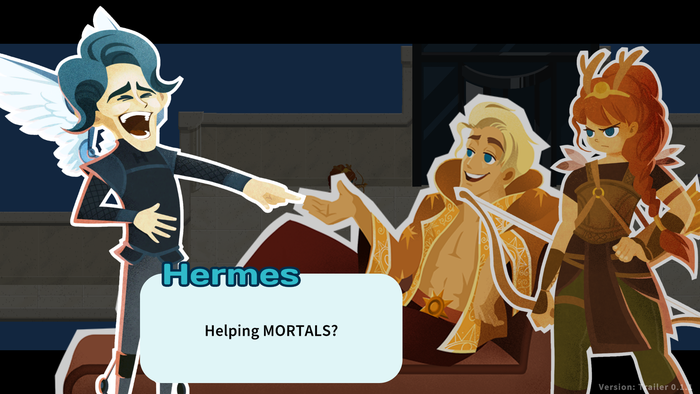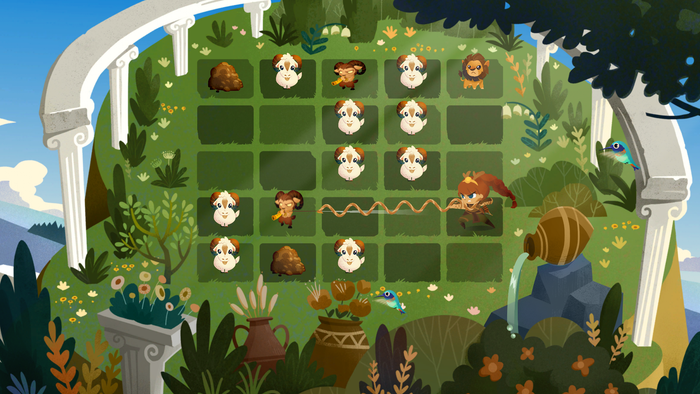Trending
Opinion: How will Project 2025 impact game developers?
The Heritage Foundation's manifesto for the possible next administration could do great harm to many, including large portions of the game development community.
Game industry programming powerhouse Moo Yu sheds light on building a better game studio.

Having spent much of his career as a gameplay programmer, the inspiration around Mythmatch is as much about Team Artichoke creative director Moo Yu’s journey of moving into design, though it might not seem apparent when playing the Steam demo. Rather than depicting a Chinese man’s personal struggles in the industry, it’s set in Greek mythology, if Hades had a cozier vibe.
There are nonetheless parallels, as Yu says “being seen as a creative force is very difficult because the stereotypes around Chinese culture is that they just copy and steal” whereas he feels other developers have the benefit of the doubt.
With Artemis, the struggle is earning her place as goddess of the hunt where she isn’t taken seriously by the immortal men of Olympus while her twin brother Apollo gets fast-tracked. Both however also have their own sense of privilege, Yu as a man in a male-dominated industry, and Artemis as someone with godlike powers (also depicted as white) in contrast to the mortals of Ithaca where you actually spend most of your time with in the core community-building aspects of the game.
“[Mythmatch’s protagonist] was never a Chinese man, so going from the struggles of a Chinese man to a white woman, I felt completely fine making that change,” he explains. “One of the things I also want to talk about was privilege. I wanted it to be clear that Artemis is an immortal with privileges that the mortals don't have, and that she’s [initially] blind to her privilege and how much harder life is for mortals, so I think that was a really important theme.”
To make a game about belonging and community, Yu also wants to avoid the pitfalls we’ve seen from the likes of indie studios like Mountains and Fullbright Games, studios that have also released games focusing on a female perspective but led by male auteurs who have since been accused of abusive behavior. “I don't like over-concentrations of power,” says Yu. “I very much consider myself someone that helps and provides and builds community.”
Yu wasn’t however blind to the fact that the characters meant the narrative, while analogous to his own experiences, including finding a community to belong to (he also cites the movies Legally Blonde and Amélie as inspirations), is ultimately centered on gender issues. It was therefore always important for him to build an inclusive studio whose team members reflected the game he wanted to make.
“Specifically, the writer must be a woman, must be able to understand instinctively rather than me doing research and trying to vaguely understand,” he says. Indeed, almost all of Team Artichoke’s members are women, including artist Beidi Guo, writer Lara Barbier, and content designer Albertine Watson. Although the team is made up of part-time roles, Yu being the sole full-time developer on Mythmatch (an arrangement admittedly down to what he’s able to afford to pay), they’re all equally credited as team members, as evidenced on the studio’s homepage.
“There’s this obsession with art having this magical intrinsic value outside of the people that create it, but for me, the goal is to bring the people together. There's so much joy in working with others and getting the best out of everyone but also watching stuff come together and seeing how ideas mix together constantly.”

Image via Team Artichoke.
One important perspective he had learned was shaping Mythmatch’s arc, which was going to have a progression one might associate with other cozy community sims. “At the beginning it was like, Artemis is trying to impress the gods [until] she's finally good enough,” he explains. “But the more I spoke to [the team], the more it became, 'You will never be good enough'-that’s the whole point of gatekeeping.”
Making sure narrative aligned with the mechanics was also important. For instance, when art came back that depicted Penelope (queen of Ithaca and Odysseus’s wife) as a Black woman, having Artemis come down as this white immortal ordering a Black mortal around suddenly felt very wrong. “Artemis doesn't understand the troubles that the mortals are going through, she shouldn't have the solutions,” Yu explains. “It should be coming from the mortals themselves.”
Subverting the usual expectations of other life sims where you go into a town and effectively become its mayor creating a place in your own image, Artemis is helping the community of Ithaca. But also rather than doing this as a white savior, the gameplay is designed so that the mortals are doing the work to solve their problems, while Artemis is more of a support in a collaborative effort.
With a part-time team, that does mean a slower development process, with no set release date for Mythmatch, but Yu accepts and embraces this. “As long as we're making the game we want to make and it comes out okay in the end, I think that's the higher priority,” he explains. “I tell everyone on my team, this is the rate, this is what I can afford. If you can find work that pays better, always prioritize that. Even if it did harm the project, the people are more important than the project.”
In getting the best out of everyone with what they can give to the project as fairly as possible, everyone is also paid a flat day rate, a practice Yu had learned from working with Die Gute Fabrik. “It’s great because it made it so you don't have a concept of juniors anymore,” he explains. “You never say, 'we'll just give juniors the junior tasks' - everyone just has tasks. Everyone asks questions to everyone else, everyone ramps up, you're never thinking, 'this person makes less so we expect less of them'. It was just such an incredible experience to be part of that, so I wanted to replicate that as much as I can.”

Image via Team Artichoke.
It’s also a practice that means avoiding the alternative other studios might be tempted to take, lowballing staff or where they feel compelled to work for free. Yu even mentions a team member who, as a newcomer to the industry, had not been expecting to be paid the full rate advertised. “I'm like, of course I'm going to pay the full rate advertised - I hired you because you can do the work I need, and this is how much the work is worth to me.”
When it comes to hiring people, it has also been important that job descriptions do not exclude people based on arbitrary parameters like number of years of experience or number of games shipped. “It's like, here's what we need you to do, and if you think you can do that, please apply,” he says, adding that this has also attracted people both new or outside of the industry.
“When you don't pay well, you naturally add bias and discrimination into your process for people, you can easily weed out certain massive demographics of people,” Yu concludes. “If you're trying to tell a story that's about gatekeeping and exclusion, you need those people on your team because they have these great stories to share about it.”
While Yu acknowledges his decisions may not be 100% satisfactory for everyone, and not all studios can afford to work slowly, at least not if its team members don’t have other projects to sustain themselves, the intention is there to make an environment where people can enjoy working in where they’re treated fairly, an issue he still thinks isn’t very common in the industry.
You May Also Like